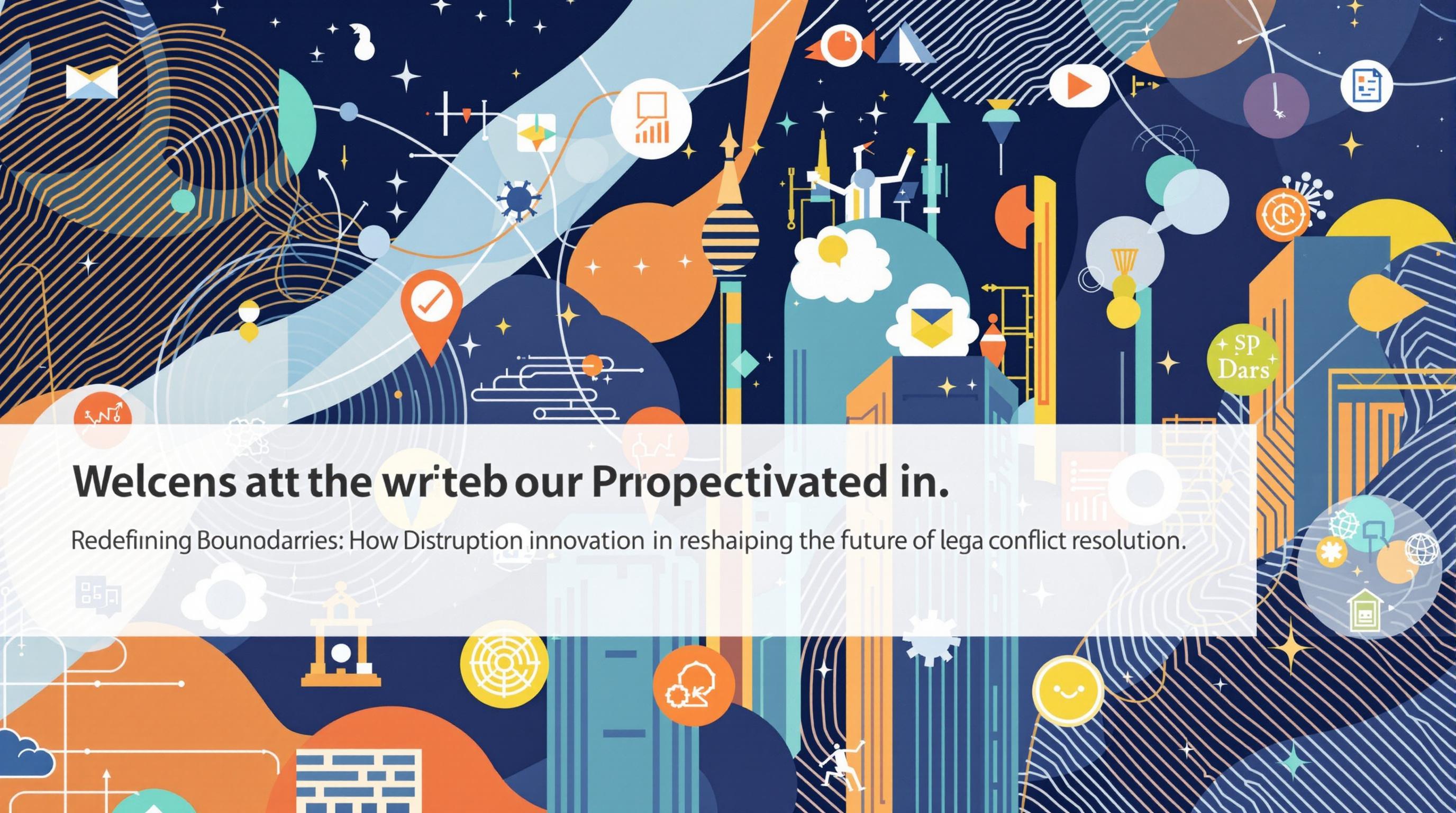Related Articles
- Redefining Boundaries: How Disruptive Innovation is Reshaping the Future of Legal Conflict Resolution
- The Future of Litigation: How Virtual Reality is Transforming Trial Preparation and Witness Testimony
- The Hidden Power of Narrative: Crafting Compelling Legal Stories Amidst Procedural Complexity
- Evolving Benchmarks: The Unexpected Impact of Pop Culture on Legal Precedents and Jury Perception
- Jurisdictional Jigsaw: How Globalization is Redefining Legal Practice and Client Representation in Uncharted Territories
- Legal Futures: The Overlooked Impact of Augmented Reality on Contract Negotiation and Dispute Resolution
Redefining Boundaries: How Disruptive Innovation is Reshaping the Future of Legal Conflict Resolution
Redefining Boundaries: How Disruptive Innovation is Reshaping the Future of Legal Conflict Resolution
The landscape of legal conflict resolution is undergoing a seismic shift due to disruptive innovations. From online dispute resolution (ODR) to artificial intelligence-driven mediation, these technologies are not just redefining boundaries; they are creating new pathways for more accessible, efficient, and effective legal solutions.
Understanding Disruptive Innovation in Legal Conflict Resolution
Disruptive innovation refers to new technologies that dramatically change the way industries operate. In the legal world, this has manifested in tools and platforms that offer alternatives to traditional litigation processes.
An Example of Change: Online Dispute Resolution
Consider online dispute resolution (ODR) systems like Modria and Matterhorn, which have grown in popularity. A survey by the National Center for State Courts found that nearly 74% of judges felt that ODR positively impacted case management by streamlining processes and reducing backlog (NCSC, 2021). These systems enable parties to resolve disputes without ever stepping into a courtroom, saving both time and money.
The Casual Approach: A Day at the Dispute Beach
Picture this: two people basking under the sun on a sandy beach. One claims the other borrowed their favorite surfboard and never returned it. Instead of dragging each other to court, they pop open their laptops, connect to an ODR platform, and resolve the dispute in under an hour—while sipping piña coladas! That’s the future; quick, painless, and with the legal system more of a lifeguard than a lifeboat.
AI: The New Lawyer in Your Pocket
Artificial intelligence (AI) is another game-changer. Imagine having a virtual lawyer at your disposal 24/7, equipped with vast databases and algorithms that can analyze cases and suggest solutions. Companies like LegalZoom and DoNotPay have begun harnessing AI to provide affordable legal services to the masses, illustrating how even those with limited means can find resolution without navigating complicated legal oceans.
Statistics show that legal representation can be prohibitively expensive, with hourly attorney fees sometimes exceeding $500. AI applications can offer initial consultations and produce legal documents for a fraction of the cost, making legal help accessible to everyone—even college students burdened with debt! In fact, DoNotPay claims to have saved users over $1 million in legal fees in one year alone (DoNotPay, 2023).
Challenges and Ethical Considerations
While the benefits of disruptive innovations are apparent, they come with challenges. The ethical implications of using AI in the legal field must be critically examined. Who is responsible if an AI-driven solution leads to an unjust outcome? Furthermore, how do we ensure that access to these tools is equitable? These are critical questions that both the tech industry and legal professionals must grapple with moving forward.
Negotiation: A New Lab for Innovation
Negotiation, once a complex dance of egos and legal jargon, is also seeing transformative improvements. The rise of virtual negotiation tools and techniques, such as collaborative online platforms, allows parties to engage in dispute resolution without the burden of physical meetings. The Harvard Program on Negotiation notes that understanding the psychology behind negotiation can lead to better outcomes, regardless of the medium (Harvard PON, 2020).
Story Time: The Sandwich Shop Dilemma
Let’s circle back to our beloved sandwich shop. A customer walks in and orders a turkey club; however, a misunderstanding leads to an unexpected veggie delight being served. Instead of loudly confronting the young cashier, the customer channels their energy into a quick virtual negotiation session. Through an app, they send their feedback directly to management and receive a speedy voucher for a future visit. Everybody’s a winner; a little technology and a dash of understanding go a long way.
Case Study: eBay and the Rise of Algorithmic Mediation
eBay’s resolution system is a notable case study in algorithmic mediation. The e-commerce giant has successfully resolved over 60 million disputes through its ODR platform, demonstrating that technology can manage conflicts efficiently while avoiding traditional litigation paths. eBay uses algorithms to predict outcomes, which facilitates quicker decisions while offering transparency to all parties involved (eBay, 2022).
The Bigger Picture: Why It Matters
The transformation of legal conflict resolution is not just about convenience. It’s about empowerment. For too long, the legal system has been perceived as an intimidating fortress, accessible only to those who can afford it. By embracing these innovative tools, we can redefine who has the power to initiate change and resolve conflicts.
As a 23-year-old writer, these advancements offer a glimmer of hope for my generation, who may feel alienated by the traditional legal system. Transparency, efficiency, and democratization of legal services are not just buzzwords; they represent a movement toward a legal landscape where every voice matters.
The Future: What Lies Ahead
So where do we go from here? The possibilities are boundless. We may see further integrations of virtual reality in mediation sessions, allowing parties to simulate interactions in a controlled environment, or blockchain technology improving the integrity of documents and agreements. As legal professionals and tech innovators collaborate, they will continue to carve out new pathways for conflict resolution.
A Final Thought: Call to Action
The evolution of legal conflict resolution isn’t just the responsibility of tech companies or lawyers; it’s on all of us. We need to advocate for accessible legal services and be open to new ways of resolving disputes. Let’s champion innovation, challenge the status quo, and pave the way for a future where everyone can achieve justice without a costly detour.
In Conclusion: Embrace the Change
The fusion of technology and law is creating a reality where conflicts can be managed more humanely and efficiently. With available tools like ODR, AI, and innovative negotiation techniques, we are reimagining the future of legal conflict resolution.
Change is here, embraced enthusiastically, so let’s not hold back! Whether you're a tech geek, legal professional, or a curious mind seeking nuance in discord, the future is bright, and it’s time to jump on this exhilarating ride!




